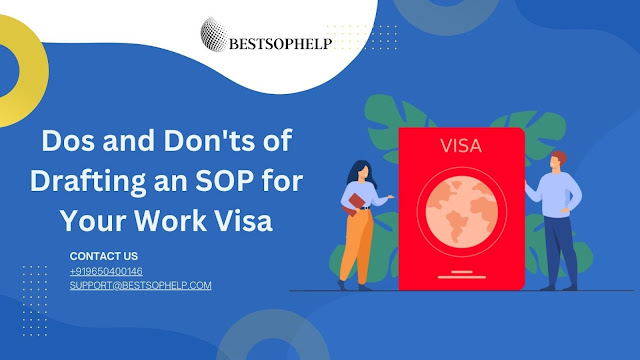The Dos and Don'ts of Writing an SOP for Visa
When it comes to applying for a visa, one crucial document that can make or break your chances is the Statement of Purpose (SOP). An SOP for visa, also known as a visa SOP, is a written statement that outlines your purpose for traveling to a foreign country. Whether it's for study, work, or tourism, a well-crafted SOP can significantly enhance your application. In this blog post, we'll explore the dos and don'ts of writing an SOP for a visa application to help you put your best foot forward.
The Dos:
Understand the Purpose:
Before you start writing your SOP for visa, it's essential to understand the specific requirements and guidelines set by the consulate or embassy of the country you're applying to. Different countries may have different expectations.
Be Clear and Concise:
A visa SOP should be clear, concise, and to the point. Avoid unnecessary details and focus on providing relevant information about your purpose of travel.
Customize for Each Application:
Avoid using a generic template. Tailor your SOP for visa to match the specific requirements of the country and the type of visa you're applying for. Mention any unique criteria that the consulate expects.
Provide Detailed Information:
Include information about your background, educational qualifications, work experience, and any other pertinent details that support your application. This helps establish your credibility.
Show Your Genuine Intentions:
Clearly articulate why you want to visit the country and what you hope to achieve during your stay. Demonstrating genuine intentions is crucial in building trust with the visa officers.
Highlight Your Strong Points:
Emphasize your strengths, achievements, and any relevant skills or experience that make you a suitable candidate for the visa. This could be academic excellence, professional achievements, or specific talents.
Address Potential Concerns:
If there are any potential red flags in your application, such as a gap in studies or employment, address them in a straightforward manner. Provide explanations or evidence to alleviate any concerns.
Follow a Structured Format:
Organize your SOP with a clear introduction, body, and conclusion. Ensure that it flows logically, making it easy for the reader to follow your narrative.
Proofread and Edit Thoroughly:
Spelling and grammatical errors can detract from the professionalism of your SOP. Proofread multiple times and consider seeking feedback from others before finalizing.
Demonstrate Knowledge of the Country:
Show that you've done your research about the country you're applying to. Highlight aspects that genuinely interest you and explain how your visit aligns with your personal and professional goals.
The Don'ts:
Exaggerate or Provide False Information:
Honesty is key. Providing false information in your SOP for visa can lead to immediate rejection and may even affect your future applications.
Use Complex Language or Jargon:
Keep the language simple and easy to understand. Avoid using complex vocabulary or technical jargon that may confuse the reader.
Include Irrelevant Information:
Stick to the main points and avoid including irrelevant details or personal anecdotes that do not contribute to the purpose of your visit.
Be Overly Emotional:
While it's important to convey your genuine intentions, avoid being overly emotional or dramatic in your writing. Maintain a professional tone throughout.
Copy SOPs from Others:
Plagiarism is a serious offense. Avoid using sample SOPs for visa application that you find online. Consulates are skilled at identifying copied content.
Neglect Proofreading:
Failing to proofread your SOP can result in careless mistakes that may harm the overall impression of your application.
Include Negative Information:
Avoid discussing negative aspects about your home country or personal circumstances unless it's directly relevant to your application.
Exceed the Word Limit:
Most consulates provide a specific word or page limit for the SOP. Exceeding this limit may result in your application being rejected.
Wait Until the Last Minute:
Writing an SOP for visa requires time and thoughtful consideration. Starting early allows you to refine your statement and seek feedback from others.
Conclusion
By adhering to these dos and don'ts, you can create a compelling and effective SOP in visa that increases your chances of a successful application. Remember, your SOP is a reflection of your intentions and suitability for the visa, so invest the time and effort needed to make it stand out. Good luck with your visa application!
For More Information Visit Our Website: Best SOP Help
Contact Us: +919650400146



.jpg)
Comments
Post a Comment